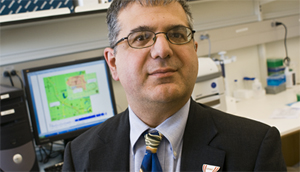To determine a patient’s level of function, health care providers traditionally have relied on responses to questionnaires.
Those are not very useful because the answers are subjective and don’t measure function, said Stephen Bonasera, M.D., Ph.D., assistant professor of geriatrics and pharmacology and experimental neuroscience at UNMC.
Instead, Dr. Bonasera is developing a nonintrusive mobile monitoring system that will objectively measure function and impact how health care is delivered for older people.
 |
Stephen Bonasera, Ph.D. |
As part of Dr. Bonasera’s study, monitors that are smaller than a deck of cards will be plugged into every room in the home. A weak Bluetooth signal captures the amount of time a person spends in that room. When they go outside, the GPS tracks activity in the community.
“All we know is where that person is and how long they are there,” Dr. Bonasera said. “This system will measure precisely how drugs affect functionality. For example, does the new drug help a person with Alzheimer’s disease maintain everyday behavior?”
His model soon will be ready for human trials.
Dr. Bonasera’s research is funded by the National Institutes of Health and the state’s tobacco settlement dollars.